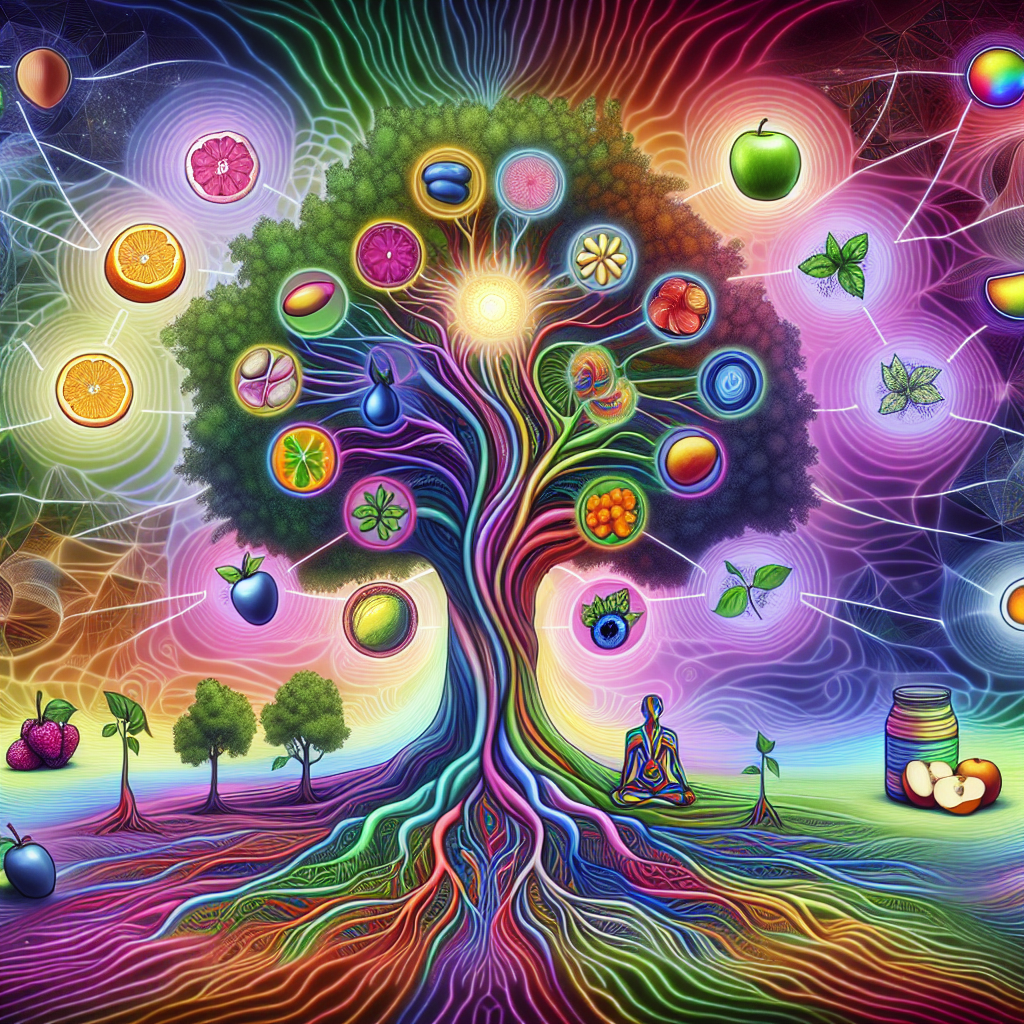Exploring Psychedelics, Wellness, and Vitamin Synergies

Discover the intriguing world of psychedelics, wellness, and vitamin synergies. Uncover the secrets of your mind and body, and embark on a journey towards a healthier, more vibrant you. Start exploring now!
Unveiling the Mysteries: A Deep Dive into Psychedelics
Psychedelics, once relegated to the fringes of society, are now experiencing a renaissance in the realms of wellness and mental health. This resurgence is not without reason. Recent scientific research has begun to unveil the mysteries of these substances, revealing their potential to synergize with vitamins and promote overall wellness.
Psychedelics, such as psilocybin (found in magic mushrooms) and lysergic acid diethylamide (LSD), are known for their ability to alter perception, mood, and cognitive processes. Historically, they have been used in religious and spiritual rituals, and more recently, in psychotherapy. However, their use has been controversial due to their potential for misuse and the lack of comprehensive scientific understanding of their effects.
In recent years, the scientific community has taken a renewed interest in psychedelics, driven by a growing body of evidence suggesting their potential therapeutic benefits. For instance, studies have shown that psilocybin can help alleviate symptoms of depression, anxiety, and post-traumatic stress disorder (PTSD). Similarly, LSD has been found to have potential benefits for mental health disorders, including anxiety and depression.
Interestingly, these benefits seem to be enhanced when psychedelics are used in conjunction with certain vitamins. This synergy between psychedelics and vitamins is a relatively new area of research, but early findings are promising. For example, studies have shown that the combination of psilocybin and niacin (vitamin B3) can enhance the psychedelic’s anti-depressive effects. Similarly, the combination of LSD and ascorbic acid (vitamin C) has been found to potentiate the psychedelic’s mood-enhancing effects.
The mechanism behind this synergy is not yet fully understood, but it is believed to involve the interaction between psychedelics and the brain’s serotonin receptors. Serotonin is a neurotransmitter that plays a crucial role in mood regulation, and both psychedelics and certain vitamins are known to influence its activity. For instance, psychedelics are thought to mimic serotonin and bind to its receptors, thereby enhancing its effects. On the other hand, vitamins like B3 and C are known to support the production and function of serotonin, potentially enhancing the effects of psychedelics.
This synergy between psychedelics and vitamins opens up exciting new possibilities for wellness and mental health. It suggests that the use of these substances could be tailored to individual needs, potentially offering a more personalized approach to mental health treatment. Moreover, it highlights the importance of a holistic approach to wellness, emphasizing the interplay between diet, lifestyle, and mental health.
However, it’s important to note that while the potential benefits of psychedelics are promising, their use should always be guided by a healthcare professional. Psychedelics are powerful substances that can have profound effects on the mind and body, and their misuse can lead to serious health risks. Therefore, anyone considering their use should do so under the supervision of a healthcare provider.
In conclusion, the exploration of psychedelics, wellness, and vitamin synergies is a fascinating and rapidly evolving field. As we continue to unveil the mysteries of these substances, we are likely to discover new ways to promote wellness and treat mental health disorders. However, as with any powerful tool, their use must be approached with caution and respect for their potential risks.
Achieving Optimal Health: A Comprehensive Guide to Wellness

Exploring the realm of wellness and optimal health often leads us down unexpected paths. In recent years, the intersection of psychedelics, wellness, and vitamin synergies has emerged as a fascinating area of study. This exploration is not about promoting recreational drug use, but rather about understanding the potential therapeutic benefits of these substances when used responsibly and in conjunction with a holistic approach to health.
Psychedelics, a class of drugs that alter perception and mood, have been used for centuries in various cultures for spiritual and healing purposes. In the modern context, research into the therapeutic use of psychedelics such as psilocybin (found in magic mushrooms) and LSD is gaining momentum. Studies suggest that these substances, when used under controlled conditions, can have profound effects on mental health, potentially helping to alleviate conditions such as depression, anxiety, and post-traumatic stress disorder.
However, the use of psychedelics in wellness is not about seeking a quick fix or magic bullet. Instead, it’s about integrating these experiences into a broader approach to health. This is where the concept of vitamin synergies comes into play. Vitamins and minerals are essential for our bodies to function optimally, and deficiencies can lead to a range of health problems. But it’s not just about taking a multivitamin and calling it a day. The way these nutrients interact can significantly impact their effectiveness.
For instance, vitamin D and calcium work together to support bone health, while vitamin C enhances the absorption of iron. Similarly, the B vitamins often work in tandem to support energy production and cognitive function. Understanding these synergies can help us make more informed choices about our diet and supplement regimen.
When it comes to psychedelics, the role of vitamins and minerals becomes even more critical. These substances can be physically and emotionally intense, and ensuring that the body is well-nourished can help support a positive experience. For example, the amino acid tryptophan, which is a precursor to the neurotransmitter serotonin, can be depleted by the use of psychedelics. Ensuring adequate intake of tryptophan-rich foods or supplements can therefore be beneficial.
Moreover, certain vitamins and minerals may help mitigate some of the potential negative effects of psychedelics. Magnesium, for instance, can help reduce muscle tension and anxiety, both of which can be side effects of these substances. B vitamins can support the nervous system and mood.
In conclusion, the exploration of psychedelics, wellness, and vitamin synergies is a complex and evolving field. It’s about understanding the potential therapeutic benefits of these substances, but also about recognizing the importance of a holistic approach to health. Psychedelics are not a panacea, but they may be a valuable tool in our wellness toolkit when used responsibly and in conjunction with a balanced diet, regular exercise, and adequate rest.
As with any aspect of health, it’s essential to do your research and consult with healthcare professionals before making any significant changes to your routine. The journey to optimal health is a personal one, and what works for one person may not work for another. But by staying informed and open-minded, we can all find our unique path to wellness.
The Power of Combination: Understanding Vitamin Synergies for Better Health
Exploring the realm of wellness, one cannot overlook the intriguing world of psychedelics and the potential synergies they may have with vitamins. The power of combination, particularly in understanding vitamin synergies, can significantly enhance our health and overall well-being.
Psychedelics, once stigmatized and relegated to the fringes of society, are now being recognized for their potential therapeutic benefits. These substances, which include psilocybin mushrooms, LSD, and ayahuasca, have been shown to have profound effects on mental health, potentially helping to alleviate conditions such as depression, anxiety, and post-traumatic stress disorder. However, the use of these substances should not be taken lightly, and it is essential to approach them with respect and caution.
In the context of wellness, it’s important to note that psychedelics are not a standalone solution. They are most effective when used in conjunction with other health-promoting practices, such as a balanced diet, regular exercise, and adequate sleep. This is where the concept of vitamin synergies comes into play.
Vitamin synergies refer to the way in which certain vitamins work together to enhance each other’s effects. For example, vitamins D and K are known to work in tandem to support bone health. Vitamin D aids in the absorption of calcium, while vitamin K helps to ensure that the calcium is directed to the bones where it is needed, rather than accumulating in the arteries. Similarly, vitamins C and E have a synergistic relationship, with vitamin C helping to regenerate vitamin E, thereby enhancing its antioxidant effects.
In the same vein, certain vitamins may also enhance the effects of psychedelics. For instance, vitamin B6 is known to play a crucial role in the production of serotonin, a neurotransmitter that is often affected by psychedelics. By ensuring adequate intake of vitamin B6, one may potentially enhance the positive effects of psychedelics on mood and mental health.
Moreover, the use of psychedelics can sometimes lead to a temporary depletion of certain nutrients in the body. This is where a well-rounded diet, rich in a variety of vitamins and minerals, can help to replenish these nutrients and support overall health.
However, it’s important to remember that while vitamin synergies can be beneficial, they are not a substitute for a balanced diet and healthy lifestyle. It’s also crucial to consult with a healthcare professional before starting any new supplement regimen, particularly if you are considering the use of psychedelics.
In conclusion, the exploration of psychedelics, wellness, and vitamin synergies opens up a fascinating new frontier in the quest for better health. By understanding the power of combination, we can harness the potential of these substances and nutrients to enhance our well-being. However, as with all aspects of health, it’s important to approach this exploration with caution, respect, and a commitment to balance and moderation.